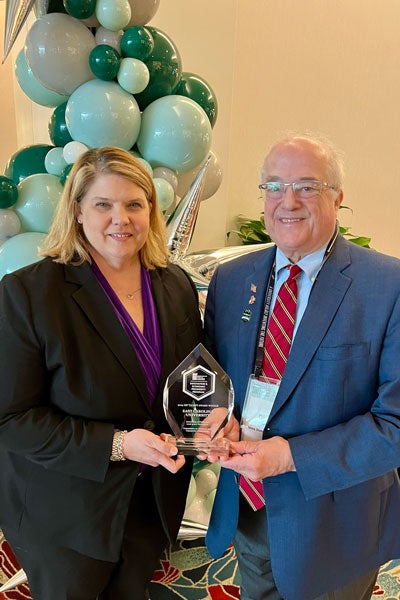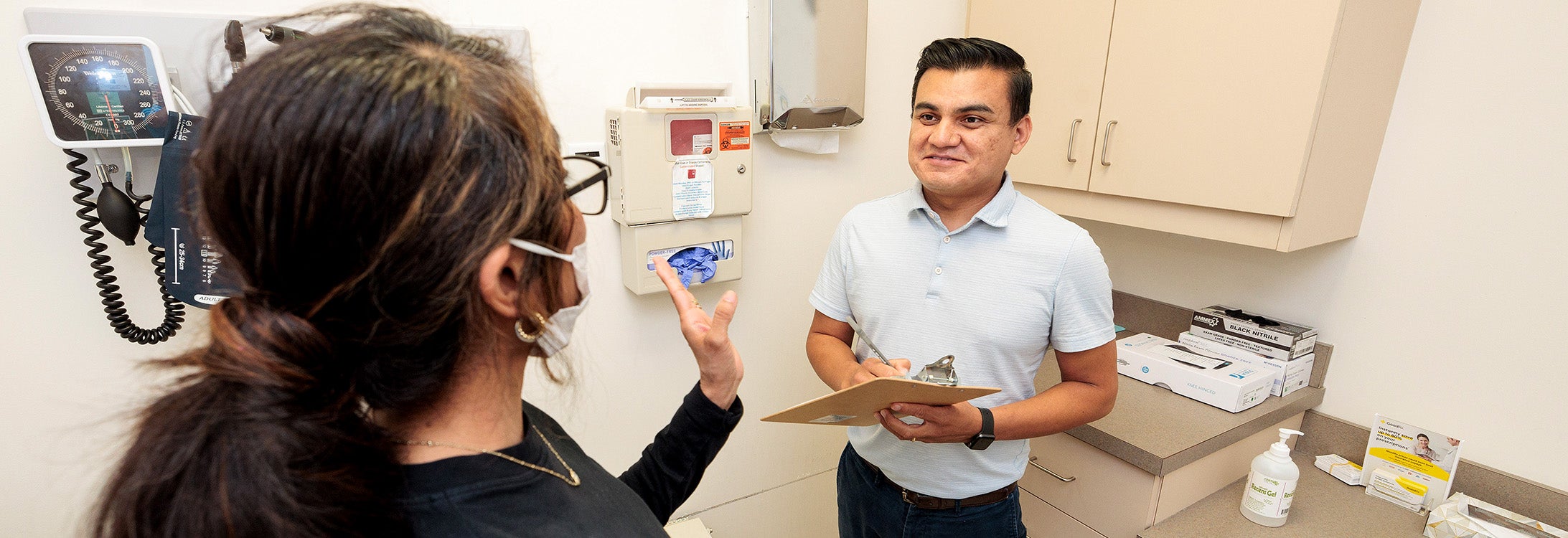APLU recognizes ECU’s commitment to community engagement
In recognition of extraordinary commitment to community engagement, innovation and economic prosperity, East Carolina University received two national awards from the Association of Public and Land-grant Universities during its annual meeting this week.
Chancellor Philip Rogers accepted the 2024 C. Peter Magrath Community Engagement Scholarship Award during the APLU’s annual meeting in Orlando on Nov. 12 on behalf of the university.
ECU also received APLU’s Innovation and Economic Prosperity award for Talent, which recognizes the university’s work as the economic hub that spurs urban revitalization while also focusing on education and workforce development throughout eastern North Carolina.
As the recipient of the Magrath Award, ECU is an exemplar of community engagement in action among public and land grant universities, said Dr. Marlene Tromp, president of Boise State University, who presented Rogers, Dr. Sharon Paynter, Dr. Angela Lamson and Dr. Tom Irons Sr. with the award trophy.
ECU was one of four finalists for the award after selection by the Engagement Scholarship Consortium (ESC) as a regional winner in August of the W.K. Kellogg Foundation Community Engagement Scholarship Awards. ECU was selected for its efforts to address suicide and significant unmet behavioral health needs stemming from economic stressors, geographical isolation, family dynamics and other health challenges facing rural North Carolina residents.
As part of the application process for the W.K. Kellogg Foundation Community Engagement Scholarship Award, ECU created a video explaining the university’s partnership with Contentnea Health. Note before viewing: This video contains mentions of suicide.
“Congratulations to East Carolina University on winning the 2024 C. Peter Magrath Community Engagement Scholarship Award,” said APLU President Mark Becker. “ECU’s multifaceted approach to improving mental health in underserved communities in North Carolina illustrates the reach and vital importance of public universities to their states’ well-being.”
In 2006, ECU launched a partnership with Contentnea Health (formerly Greene County Health Care) to increase access to critical primary health care and behavioral health services for underserved populations. Suicide remains one of the leading causes of death among those ages 10-65 in North Carolina, with higher rates in rural areas and significant unmet mental health needs stemming from economic stressors, geographical isolation, family dynamics and health challenges. Through the years, the partnership has proven mutually beneficial for community members and university students and has provided 154 doctoral and master’s students with foundational clinical and research training.
The partnership has supported more than 126,000 integrated behavioral health care encounters with patients through primary care clinics, dental clinics, on farms and in school settings since its inception. The effort provides behavioral health services on average to 7,000 people each year, Tromp noted in her remarks announcing ECU as the Magrath recipient.
Accepting the award, Rogers said, “Our university was founded in 1907 as an institution designed to serve eastern North Carolina, and through our more than 115 years, we’ve adapted and delivered on the promises of opportunities to the people of our state through our intentional mission of student success, public service and regional transformation.
“In my mind, there is no better initiative that personifies our mission and vision to be a national model for community engagement than ECU’s expansive partnership with Contentnea Health. We’re proud to do this work, proud to serve our community, and deeply proud to accept this honor that demonstrates the public value of higher education to our communities and society,” Rogers said.
“This partnership is an example of the power of cutting-edge innovation driven jointly by academic and non-academic partners,” said Dr. Sharon Paynter, chief innovation and engagement office and interim chief research officer at ECU. “It is a recognition that our institution has built the infrastructure to support engaged scholarship and serves as a partner with organizations to address real-world needs.”

Chancellor Philip Rogers, Dr. Angela Lamson, Dr. Tom Irons and Dr. Sharon Paynter pose with the C. Peter Magrath Community Engagement Scholarship Award trophy after being announced as the 2024 recipient during the APLU’s annual meeting.
From the beginning of the project, Dr. Angela Lamson, Nancy W. Darden Distinguished Professor in the Department of Human Development and Family Science and Senior Fellow in the Office of Innovation and Engagement, has been involved.
“In 2006, I stood alongside three pioneers in health care as we envisioned how patients in eastern North Carolina could receive access to behavioral health services as part of their medical or dental visit, in school settings, on local farms, and at community events,” said Lamson. “We are so thankful for the thousands of patients who have welcomed ECU medical family therapists into their care and the many dedicated providers, leaders and staff who shared our passion for delivering integrated behavioral health care services.
“Today our partnership continues to address critical health needs and fosters a proactive approach to addressing mental health. We know this approach to integrated care saves lives every day,” she said.
Working with Lamson and others to establish the partnership was Doug Smith, the former CEO of Contentnea Health.
“Community health centers look at the needs of the population that they serve. At Contentnea Health, we expanded from medical care to dental care; over time, as I met with Dr. Angela Lamson and Dr. Jennifer Hodgson, I saw the importance of that care model to have a medical family therapist as part of the model for everyone who comes to Contentnea Health. Community health centers vary across the country; in my work, I saw the whole gamut. This partnership provided a perfect fit to the needs of our patients,” said Smith.
“We built Contentnea Health on a foundation of service and commitment to the community,” said Contentnea Health CEO Melissa Torres. “The question we ask ourselves at the beginning of every collaborative opportunity is this: How does this opportunity benefit the health of our community? The answer to that question was clear in our partnership with East Carolina University. The community benefitted. We improved access to care by helping train therapists and by offering much-needed critical mental health care to our community. Together, we took one more step toward our vision of healthy people, healthy families and healthy communities.”
As he sat in an Orlando convention center ballroom after learning the project he started with a handful of others 18 years ago had just won a national community engagement award, Irons reflected on the dream that became a reality. Irons, a pediatrician and a lifelong advocate for community health programs, served in multiple roles during his more than 40-year career at ECU’s medical school.
“When we started on this, we were dreaming, looking for better ways to do what we do — which is caring for our marginalized neighbors or those who are otherwise disadvantaged,” Irons said. “We wanted to do something that would last and something that would give the community a voice that was equal to ours. And you know what? We did it.”
Innovation and Economic Prosperity Award – Talent
ECU also brought home a second honor from the meeting – the Innovation and Economic Prosperity Award in the Talent category. This award recognizes exemplary initiatives in education and workforce development.
ECU was recognized by APLU for using stakeholder engagement to assess, design and implement innovative talent strategies for key industry sectors across North Carolina.

Dr. Sharon Paynter receives the 2024 APLU’s Innovation and Economic Prosperity award for Talent on behalf of the university from David Spalding of Iowa State University, which won the APLU’s IEP Connections award last year.
Several programs were highlighted as showcasing ECU’s successes in developing talent. The programs offer transformative learning experiences to students, preparing them to better address the state’s pressing needs and cultivating professionals who have gone on to excel in their fields. Examples include a telepsychiatry program, a teacher preparation initiative that enhances the success of our youngest learners and the integration of university-based dental clinics within rural communities.
Mental health and substance use-related emergency visits can strain resources. ECU developed the North Carolina Statewide Telepsychiatry Program to ensure the efficient use of mental health resources and enhance the quality of mental health care available to patients in rural and underserved regions. The program, developed in 2013 by ECU’s Center for Telepsychiatry and embedded in 29 hospitals as well as 27 community-based contracted sites in 60 counties across the state, has supported over 60,000 emergency room assessments and over 20,000 patients. This includes three clinical provider hubs and a workforce of 23 consultant providers.
The School of Dental Medicine’s Community Service Learning Centers (CSLCs) offer a pioneering approach, bringing dental expertise to North Carolina’s most rural communities and delivering services to some of the state’s most underserved areas. The ECU School of Dental Medicine increases access to innovative dental care in areas with limited oral health care options while recruiting students interested in serving the state’s rural communities.
North Carolina ranks near the bottom nationally in the number of dentists per capita. The eight CSLCs are strategically placed training clinics that help bridge the gap across the state while training future dental professionals to serve where most needed. Fourth-year dental students complete half-year rotations, providing dental care to patients and exposing them to multiple cultures and communities. The School of Dental Medicine has graduated over 500 students since 2015, and approximately 90% percent of graduates have gone on to practice dentistry in the state.
Also enhancing the workforce to address current needs of the state is the Early Educator Support Mentorship Program. It’s a birth-to-kindergarten teacher preparation initiative that incorporates rigorous training to better equip educators in supporting our youngest learners. ECU serves as a regional hub for the statewide program, which is required of all early childhood educators in nonpublic schools.
The program gives 800 N.C. pre-kindergarten teachers a pathway to earn or maintain their teaching license while promoting positive developmental outcomes for over 8,000 children annually.
“Growing industries are in need of a talented workforce, and ECU is developing innovative ways to train tomorrow’s professionals while retaining talent, which is crucial for the region and community development,” said Paynter. “Working with community and industry partners, ECU continues to assess, design, implement innovative programing and develop pathways for workforce success. It is part of ECU’s mission — to serve.”
—- Kim Tilghman contributed.
